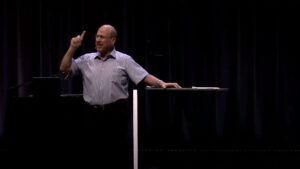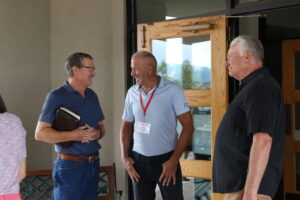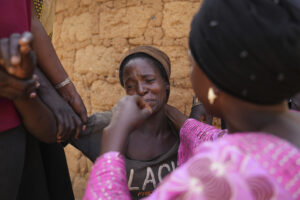
DALLAS (BP)–Acting on the recommendation of the presidential search committee for Criswell College, the school’s trustees unanimously elected former president Jerry Johnson to fill the post he resigned two years ago.
“There’s really only one reason I would want to come back that matters, and that is if God calls me,” Johnson said at the Nov. 5 board meeting prior to trustees’ secret ballot vote.
“I am a Baptist and believe in the process of the people, committee and the board. And if God is leading, I receive that, along with what I’ve sensed in prayer: God’s call to come back and finish the assignment I started years ago.”
Johnson became president in 2004 and resigned in 2008, when Criswell was still under the ministry umbrella of First Baptist Church of Dallas. But now the school is self-governing and independent.
Upon accepting the invitation to return, Johnson immediately announced the offer of a $600,000 matching grant from the W.A. Criswell Foundation. “I’m going to focus in the next 90 days on a goal of raising and matching” those funds, he said, calling on board members to lead the way in giving.
Johnson said many in the recent election cycle emphasized a return to the Unites States’ founding documents, and that reminded him of Criswell College’s founding documents. Displaying a written copy of W.A. Criswell’s vision for the school and a Bible, Johnson said, “What I have to say about the college, and what I believe about Criswell College, really comes from these two documents.”
Commenting on one of the school’s distinctions — a commitment to the “inerrancy, infallibility and authority of Scripture” — Johnson said, “Whatever else happens here, we must hold this as our top value.
Board members applauded when Johnson said, “Every faculty member will always be asked initially and annually to recommit to the inspiration, infallibility and inerrancy of Holy Scripture.”
Johnson noted the school’s requirement that all students study Greek and Hebrew. “If we believe this is God’s written Word, then teaching students to understand the way it was written is important.”
Criswell College “is a school built for the glory of God to magnify the Lord Jesus and His mission and meaning to the world,” Johnson said. “Yes, this is a preacher college. But Dr. Criswell, even in the school’s infancy, envisioned more: Kingdom workers, laypeople, not just to the church, but to the world.”
Saying he wanted to continue with the counseling and humanities curricula, Johnson revealed his desire to expand to education, communication and other disciplines.
Citing a third focus of the school — evangelism — Johnson said, “I saved the best for last in many ways, ‘especially for the saving of the lost,’ quoting Criswell’s words. We must pass on to these students a heart for the lost and knowledge of how to preach the Gospel, and we must continue to require international mission trips to get students out of their comfort zone and into another context.”
Search committee chairman Steve Washburn said the committee reflected a “healthy diversity of convictions. We decided to take an objective approach to our search, using the presidential qualifications specified in our new bylaws as our standard. Each committee member used this standard to conduct personal evaluations of every candidate.
“In the course of our work we were privileged to consider some of the most godly and qualified men in the Southern Baptist Convention, and we ultimately agreed that Dr. Jerry Johnson was the only man who met all the specified qualifications for president,” said Washburn, pastor of First Baptist Church in Pflugerville, Texas. “We asked the Lord to overwhelm us with clarity in our choice, and we’re grateful to God for doing so.”
Lamar Cooper, executive vice president and provost, who has served the past two years as Criswell College’s interim president, wrote, “On October 5 of this year the Criswell College celebrated its fortieth year carrying forth the vision God gave our founder, Dr. W.A. Criswell. How appropriate that exactly one month later God would select a new president by returning Dr. Jerry Johnson to lead the college.”
Cooper said Johnson is “eminently qualified by his proven leadership as dean of Boyce College at Southern Seminary, as vice president for faculty development and dean of the faculty at Midwestern Seminary, and four years as the president of Criswell College. I join the student body, staff, and faculty in welcoming the return of Dr. Jerry Johnson.”
His second stint as Criswell College president begins Nov. 15, though he will continue serving Midwestern Baptist Theological Seminary two days a week until Dec. 31. This allows Johnson to begin his presidential role at Criswell, to represent Criswell College at the annual meeting of the Southern Baptists of Texas Convention, and to complete the fall semester at Midwestern as the seminary prepares to fill the position Johnson vacates there.
Johnson, a native of Malakoff, Texas, earned a bachelor of arts in biblical studies at Criswell in 1986; a master of arts from Denver Seminary in 1997, where he majored in historical and theological studies; and a doctor of philosophy from Southern Baptist Theological Seminary in 2003, where he majored in Christian ethics and minored in systematic theology and philosophy.
Associated with Southern Seminary in various roles for 14 years, Johnson was dean of Boyce College, served on the seminary’s executive cabinet, was assistant director of development, and a trustee from 1989-98, serving as board chairman two of those years. He has served at Midwestern Seminary since January 2009.
While Johnson was president of Criswell College, from 2004-08, student enrollment increased by more than 50 percent, from approximately 300 to almost 500. Johnson led the school to financial profitability, secured funding for scholarships and endowed chairs and garnered a multi-million-dollar land gift for a future campus or for liquidation.
His experience includes a pastorate at Ireland Baptist Church in Ireland, Texas, an internship at FBC Dallas and service as a youth pastor at Central Baptist Church in Aurora, Colo., where he later became pastor. He also served as pastor of Cornerstone Baptist Church in Littleton, Colo., and held interim pastorates in Indiana, Kentucky and Texas.
“Jerry Johnson has the head of an academician, the heart of a pastor and the hands of a servant. He is uniquely equipped to lead Criswell College into the future,” said Jim Richards, executive director of the Southern Baptists of Texas Convention. “He has my enthusiastic and unqualified support. The SBTC has a dear and devoted friend in Jerry Johnson.”
R. Philip Roberts, president of Midwestern Seminary, wrote, “While Dr. Johnson’s time at Midwestern was less than two years, he made significant contributions to MBTS and Midwestern Baptist College. I found his support, advice, diligent work and warm friendship to be of great value to me and to the institution as a whole. I will miss him. Sensing, however, that Jerry has sought and found God’s will in this matter, he goes with my utmost support and encouragement. We will, however, look forward to having Dr. Johnson back with us at MBTS on various occasions. As well, we will seek opportunities to serve together, the cause of Christ and His Gospel.”
GOD IS THE ULTIMATE MATCHMAKER, WRIGHT SAYS — Choosing the right mate is a decision that must be based upon trust in God as the ultimate matchmaker, Bryant Wright told Union University students.
“There is no greater joy, there is no greater fulfillment, there is no greater fun than being married to the right mate,” said Wright, pastor of Johnson Ferry Baptist Church in Marietta, Ga., and president of the Southern Baptist Convention.
Wright spoke in a chapel service Oct. 27 and afterward met with a group of Union administrators, faculty and staff to discuss his vision for the SBC.
In his chapel address, Wright based his message on the passage from Genesis 2 recounting God’s creation of a wife for Adam. A wise decision about a spouse is important because divorce is an all-too-common reality that causes much heartache and pain, Wright said.
He noted that the divorce rates are much lower in countries where the parents arrange marriages, and he said the reason for that is because the unions are based upon compatibility. That’s why people need to trust God to lead them to the right person and must be in tune with God to be able to hear and follow His leading.
“He knows more about the perfect match for you and anybody on earth,” Wright said.
Wright observed how the text in Genesis 2 indicates that both men and women are to make an emotional break with their parents when they marry, and that spouses should be best friends.
“If the person you are about to marry is not your best friend, call it off or slow it down,” Wright said.
He advised students about the importance of maintaining that friendship during marriage and said another crucial component of a successful marriage is a mindset of total commitment. Marriages without such a mindset are prone to failure, Wright said, because difficult times are going to come.
“That person is going to disappoint you,” he said. “You’re going to disappoint them.”
Wright talked to students about the importance of sexual purity, saying that “sexual enjoyment is the wonderful gift that God has designed for marriage” and emphasizing that it is a gift for marriage only.
No matter how compatible two people might be, Wright said the most important component of a healthy marriage is a mutual commitment to Jesus Christ. He told students that giving their lives to Christ is the first step in finding the right mate, and he said that a Christian should only seek to marry another Christian.
“Don’t settle for second best,” Wright said. “Seek God’s best when it comes to choosing your mate.”
Audio from Wright’s message is available at https://www.uu.edu/audio/detail.cfm?ID=513.
In a luncheon after chapel with about 20 Union administrators, faculty and staff, Wright said his top priority as SBC president is to challenge individual Southern Baptist churches to fall in love with Jesus again.
“If we fall in love with Jesus again, we tend to fall in love with the lost again,” he said.
He also discussed the need for what he is calling a radical reprioritization of Cooperative Program funding and the importance of churches taking mission trips to energize their members for world missions.
CAMPBELLSVILLE UNIV. OUTREACH MARKS 10 YEARS — Kentucky Heartland Outreach, founded by Michael Carter, president of Campbellsville University, is celebrating 10 years of service to low-income families and individuals.
The primary goal of KHO, according to Carter, is “to provide Campbellsville University students and others with an organized program of servant evangelism by engaging them in providing home repairs for lower-income families.” The hope is that while the work of KHO provides for physical needs, it may also provide for the spiritual needs of those they help.
KHO provides services to 13 counties in south-central Kentucky. When the ministry was launched in 2000, Todd Parish, a Campbellsville graduate, was appointed executive director, and he remains in the position.
During the course of 10 years, KHO has helped repair the homes and lives of more than 1,000 families.
“It’s been amazing to see the way God has used KHO over the past 10 years. With God’s help, we have been able to help hundreds of homeowners over the past 10 years, and we strive to help that many, and more, in the years to come,” Parish said.
KHO partners with Campbellsville University’s program for freshmen, FIRST CLASS. Each class spends one day as a part of KHO’s Repair Affair, going to a home and doing home improvement projects in hopes that the students will see the importance of servant leadership and developing compassion for others. This experience is taken back to the classroom where the instructor and mentor discuss the importance of serving others.
KHO works with hundreds of high school students throughout the summer, training them in home improvements, such as constructing decks and shingling roofs. The students also are guided spiritually during the week through on-site devotions and evening worship services.
This past summer, KHO worked with 42 churches from 12 states, witnessed 72 professions of faith and made repairs to 70 homes with the help of 913 volunteers. Campbellsville University hosted 561 of those volunteers for three weeks, providing them with housing and a place to worship. In those three weeks, 29 professions of faith were recorded.
In the summer months, KHO uses interns to work with volunteers. This summer there were 12 interns, seven of whom were current or former Campbellsville University students.
KHO functions through contributions from donors. Much of their support comes from organizations such as Campbellsville University and Kentucky Housing Corporation.
“KHC gave us a startup grant, which allowed the purchase of our first tools and office equipment. KHC’s continued annual support through grants has allowed us to continue helping more families year after year,” Parish said.
Among the ministry’s goals is to double the number of volunteers and homes helped in a year’s time. In the near future, they hope to build branch offices within their service area. To learn more about the work and mission of KHO, visit khohome.org.
CALIFORNIA BAPTIST HEADS TO PACWEST — California Baptist University has accepted an invitation to join the Pacific West Conference (PacWest) in NCAA Division II, beginning with the 2011-12 athletic seasons.
CBU will become the 10th school in the PacWest, joining three San Francisco Bay Area schools, Notre Dame de Namur University, Academy of Art University and Dominican University of California; Grand Canyon University in Arizona; Dixie State College in Utah; and four Hawaii schools, Chaminade University of Honolulu, Brigham Young University Hawaii, the University of Hawai’i at Hilo and Hawai’i Pacific University.
California Baptist, known as the Lancers, will depart from the Golden State Athletic Conference after the 2010-11 season. The GSAC, which consists of Christian colleges, is affiliated with the National Association of Intercollegiate Athletics (NAIA). GSAC members, apart from CBU, are Azusa Pacific University, Biola University, Concordia University, Fresno Pacific University, Point Loma Nazarene University, Vanguard University, Westmont College, Hope International University, San Diego Christian College and The Master’s College.
CBU received a unanimous invitation to enter the PacWest from the member institutions’ presidents, chancellors and chief executive officers in October, three months after the NCAA approved CBU’s application for D-II membership. The NCAA’s D-II division, encompassing 288 schools nationally, requires member institutions to offer at least 10 sports (at least five for men and five for women, or four for men and six for women), including two team sports for each gender.
PacWest commissioner Bob Hogue said the addition of CBU “moves the PacWest into Southern California for the first time and adds another great place to our growing list of universities as the most beautiful destination conference in the entire NCAA.”
CBU President Ronald L. Ellis said the PacWest invitation is “a tremendous affirmation of the high caliber, nationally competitive athletic programs at California Baptist University.”
“More importantly for CBU,” Ellis said, “it represents another significant step forward in our 15-plus years’ effort to put in place the building blocks to create a university committed to the Great Commission with a global impact.”
The Lancers, who joined the NAIA in 1969, have won 19 national championships since 1999.
PacWest members compete in men’s and women’s basketball, soccer and cross country; men’s baseball and golf; and women’s volleyball, softball and tennis. CBU, with a 4,715-member student body, also competes in swimming and diving, men’s and women’s water polo, track, wrestling, men’s volleyball, women’s golf and cheerleading.
MISSIONS CONFERENCE INSPIRES STUDENTS — The Baptist College of Florida in Graceville welcomed missions professor Keith Eitel from Southwestern Baptist Theological Seminary for its annual Missions Conference in October.
In every service, Eitel challenged students to be fully surrendered, prayer-filled messengers sacrificially engaged in the missionary task.
“He was God’s man for this conference,” said BCF missions professor Rich Elligson. “He was just the right mix of missionary, theologian, communicator and motivator. If we had parked a 747 on the back parking lot after the chapel service on Wednesday, I believe we could have loaded it with folks headed into the mission field.”
In addition to the motivational preaching, more than a dozen mission agencies were represented on campus, giving them the opportunity to interact with students, share their visions and recruit for upcoming mission projects.
Traditionally held in the spring semester, this year’s conference, with the theme of “Opening Doors to Our Neighborhood and the World,” was scheduled for the fall to give students more time for project preparation and fundraising.
By the end of the conference, 28 students had made some type of commitment for missions participation. Decisions ranged from commitments to pray to commitments to go.
“This conference is always a highlight for both our BCF family and the missions organizations represented,” Elligson said. “It has resulted in renewed missions commitments, dozens of missions partnerships, and produced countless results for the Kingdom of God. The Gospel is all about missions, and this is just one more way that the BCF community can participate in Kingdom building, as we seek to open doors in our neighborhood and around the world.”
NOBTS FACILITATES CONTEMPORARY MUSIC CONFABS — A group of New Orleans Baptist Theological Seminary faculty members and graduates, along with worship leadership experts from across the Southeast, joined together to lead a pair of worship conferences aimed at improving the quality of contemporary worship music in churches and laying a better theological foundation for worship.
The first conference, called “Unlimited,” was held at North Metro First Baptist Church in Lawrenceville, Ga., while “The Rehearsal” took place at the NOBTS main campus and Celebration Church in Metairie, La.
The conferences grew out of a series of conversations between NOBTS faculty and graduates over the past year regarding what could be done to help churches of all sorts achieve improved worship experiences each week.
While the conferences targeted worship leaders from all types of music, both traditional and contemporary, they were especially geared toward the contemporary worship style, where training strategies are still in flux.
“Training the contemporary worship leader in an academic setting and the local church has a short history and little research is available to authenticate an efficient and effective approach,” said Greg Woodward, NOBTS professor and chair of the seminary’s church music ministries division. “We are excited about playing a role in practical training and establishing research to support our approach.”
In the Atlanta area, NOBTS professor Michael Sharp and master of divinity graduate Jake Sumner met earlier this year to discuss what could be done in that region.
Sumner, who coordinates student worship at Sugarloaf United Methodist Church in Duluth, Ga., had been offering his students occasional Saturday seminars to help develop their musical knowhow. Sumner and Sharp began to explore how that one-day-training model could be offered on a larger scale.
“We just started praying about that to see how we could meet those needs in our metro area,” Sharp said.
About the same time, Woodward discussed a similar idea with some of the other music professors in New Orleans. Soon, Woodward and Sharp met to combine forces. Woodward said it didn’t take long for them to realize they were on to something.
“When he and I talked in January, it appeared almost immediately like this was something God was leading us to do,” Woodward said of Sharp.
Both Unlimited, held on Sept. 25, and The Rehearsal on Oct. 2 teamed participants with experts in the field of worship leadership and the Christian music industry. In Atlanta, Rory Noland, director of Heart of the Artist Ministries, led the conference, while the Atlanta-based Brett Younker Band provided music. The conference also featured Nashville-based singer/songwriter James Tealy, and Lisa Jones, a former member of the group Truth, among others.
The New Orleans conference featured NOBTS professors like Ed Steele and Darryl Ferrington and local musicians including Celebration Church staff members John Frady and Dwight Fitch.
The conferences opened with a worship set and introductory remarks from leaders. Participants then attended breakout sessions that covered such topics as songwriting and leading band practices and offered instruction on specific instruments.
Woodward said the morning session in New Orleans offered specific tips for communicating with band members and taught techniques like “focused listening” for learning new contemporary songs from the original recordings. He stressed that it’s crucial for band leaders, especially those involved with contemporary worship music, to know how to manage a practice and to know the basics of all the instruments in the band.
“We encouraged them to go to the class they didn’t know much about,” Woodward said. “A really good worship leader has to think like a producer in the contemporary Christian world.”
Evan Payne, bassist for New Orleans’ First Baptist Church’s worship band, said the breakout sessions he helped lead were made up, for the most part, of young musicians still working to master the bass guitar. For them, Payne stressed the importance of memorizing music each week in order to better follow where the worship leader guides.
“That’s the one thing I really emphasized,” Payne said. “You’ve got to learn your music, because learning your music allows you to play around it and not be bound to it.”
And at both conferences, NOBTS students were given the opportunity to apply attendance at the conference to class work for courses like “Planning and Leading Worship.”
The two conferences offered a balance of theological instruction with practical music training, and their names represented both of those emphases.
Sharp and Sumner said they took the name “Unlimited” from the doxology at the end of the Lord’s Prayer which reads “for thine is the kingdom and the power and the glory forever, amen.”
“God has an unlimited Kingdom, unlimited power and unlimited glory,” Sumner explained.
Unlimited Kingdom carries the idea of “we’re a part of something much bigger than what we do on Sunday,” Sumner said. Unlimited power reminds the worship leader that it’s through God’s power that people worship God, and not through the finesse of the worship leader. Unlimited glory, then, reminds worship leaders that what they do is for God’s glory and not their own.
“It’s one little word, but we definitely pulled a lot of connections out of that,” Sumner said.
Excellent worship leading doesn’t end with a good theological foundation. The name “The Rehearsal” reminds worship leaders that they must also work to achieve musical excellence — both from themselves and their band members — in order to best lead others in worship.
Unlimited and The Rehearsal were deemed successes, and not just numerically. While the Atlanta conference drew about 150 attendees and the one in New Orleans drew about 60, it was the diversity represented at both conferences that was most impressive, leaders said.
With different nationalities, a variety of music styles and both young people and older adults, the diversity at the conferences got to the heart of worship, Sumner said.
“It was a bigger picture of what the church really is,” Sumner said. “It was really neat to see so many people come together under the banner of worshiping God and leading others to do the same.”
Sharp, Sumner and Woodward all said plans are underway for follow up conferences and possibly expanding to additional cities.
–30–
Based on reports by Norm Miller and Tammi Reed Ledbetter of the Southern Baptist TEXAN, Tim Ellsworth of Union University, Katie Johnson of Campbellsville University, Mark Wyatt of California Baptist University, Sandra Richards of the Baptist College of Florida and Frank Michael McCormack of New Orleans Baptist Theological Seminary.














